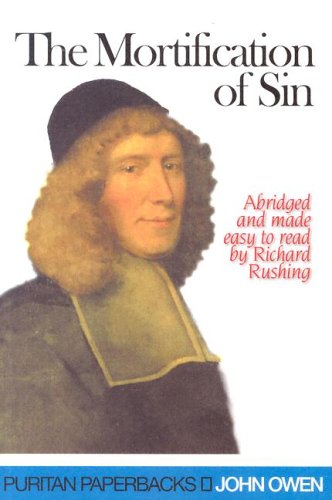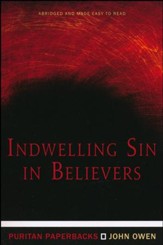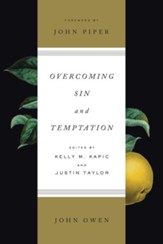
Quotes by John Owen
Did Christ die and shall sin live? Was He crucified in the world, and shall our affections to the world be quick and lively? Oh, where is the spirit of Him, who by the cross of Christ was crucified to the world, and the world to Him!
Let not men deceive themselves, sanctification is a qualification indispensably necessary unto those who will be under the conduct of the Lord Christ unto salvation. He leads none to heaven but whom He sanctifies on the earth. This living Head will not admit of dead members.
I do not understand how a man can be a true believer unto whom sin is not the greatest burden, sorrow, and trouble.
There are two things that are suited to humble the soul of men, a due consideration of God, and then ourselves. Of God, in His greatness, glory, holiness, power, majesty and authority; ourselves, in our mean, abject and sinful condition.
The mind is a leading faculty of the soul. When the mind fixes upon an object or course of action, the will and the affections (heart) follow suit. They are incapable of any other consideration… the mind’s office is to guide, to direct, to choose and to lead.
Think of the guilt of sin, that you may be humbled. Think of the power of sin, that you may seek strength against it. Think not of the matter of sin…lest you be more and more entangled.
A Puritan Golden Treasury, compiled by I.D.E. Thomas, by permission of Banner of Truth, Carlisle, PA. 2000, p. 293.
The nearer anyone is to heaven, the more earnestly he desires to be there, because Christ is there.
God hath work to do in this world; and to desert it because of its difficulties and entanglements, is to cast off His authority. It is not enough that we be just, that we be righteous, and walk with God in holiness; but we must also serve our generation as David did before he fell asleep.
A Puritan Golden Treasury, compiled by I.D.E. Thomas, by permission of Banner of Truth, Carlisle, PA. 2000, p. 258.
A man preacheth that sermon only well unto others which preacheth itself in his own soul… If the word do not dwell with power in us, it will not pass with power from us.
The True Nature of a Gospel Church, in The Works of John Owen, ed. W. H. Goold, by permission Banner of Truth, Carlisle, PA.
A sermon is not made with an eye upon the sermon, but with both eyes upon the people and all the heart upon God.
Quoted by Curtis C. Thomas, Practical Wisdom for Pastors, Crossway Books, 2001, p. 47.
There is no imagination wherewith man is besotted, more foolish, none so pernicious, as this – that persons not purified, not sanctified, not made holy in their life, should afterwards be taken into that state of blessedness which consists in the enjoyment of God. Neither can such persons enjoy God, nor would God be a reward to them. Holiness indeed is perfected in heaven: but the beginning of it is invariably confined to this world.
A Puritan Golden Treasury, compiled by I.D.E. Thomas, by permission of Banner of Truth, Carlisle, PA. 2000, p. 141.
The best duties of unbelievers are but white lies.
A Puritan Golden Treasury, compiled by I.D.E. Thomas, by permission of Banner of Truth, Carlisle, PA. 2000, p. 273.
Sin aims always at the utmost; every time it rises up to tempt or entice, might it have its own course, it would go out the utmost sin in that kind. Every unclean thought or glance would be adultery if it could; every covetous desire would be oppression, every thought of unbelief would be atheism, might it grow to its head.
And as men’s diversions increase from the world, so do their entanglements from Satan. When they have more to do in the world than they can well manage, they shall have more to do from Satan than they can well withstand.
This is the saddest warfare that any poor creature can be engaged in (fighting against sin without the Holy Spirit). A soul under the power of conviction from the law is pressed to fight against sin, but hath no strength for the contest. They cannot but fight, and they can never conquer; they are like men thrust on the sword of enemies on purpose to be slain. The law drives them on, and sin beats them back.
The Father imposed His wrath due unto, and the Son underwent punishment for, either: 1. All the sins of all men. 2. All the sins of some men. 3. Some of the sins of some men. In which case it may be said: a. That if the last be true, all men have some sins to answer for, and so none are saved. b. That if the second be true, then Christ, in their stead suffered for all the sins of all the elect in the whole world, and this is the truth. c. But if the first be the case, why are not all men free from the punishment due unto their sins? You answer, Because of unbelief. I ask, Is this unbelief a sin, or is it not? If it be, then Christ suffered the punishment due unto it, or He did not. If He did, why must that hinder them more than their other sins for which He died? If He did not, He did not die for all their sins!
The greatest sorrow and burden you can lay upon the Father, the greatest unkindness you can do to Him is not to believe that He loves you.
There is an infinite distance between God and His creatures, and it is an act of sheer grace for Him to take notice of earthly things. Christ, as God, is completely self-sufficient in His own eternal blessedness. How great, then, is the glory of His self-humiliation in taking our nature that He might bring us to God! Such humiliation was not forced on Him; He freely chose to do it.
He who prays as he ought will endeavor to live as he prays.
Only what God has commanded in His word should be regarded as binding; in all else there may be liberty of actions.
Quoted by Sinclair B. Ferguson, John Owen on the Christian Life, The Banner of Truth Trust, 1987, p. 154.
I do verily believe that when God shall accomplish [unity], it will be the effect of love, and not the cause of love. It will proceed from love, before it brings forth love.
The most tremendous judgment of God in this world is the hardening of the hearts of men.
I do not understand how a man can be a true believer, in whom sin is not the greatest burden, sorrow and trouble.
For the most part we live upon successes, not promises: unless we see and feel the print of victories, we will not believe.
A Puritan Golden Treasury, compiled by I.D.E. Thomas, by permission of Banner of Truth, Carlisle, PA. 2000, p. 227.
Yet the duties God requires of us are not in proportion to the strength we possess in ourselves. Rather, they are proportional to the resources available to us in Christ. We do not have the ability in ourselves to accomplish the least of God’s tasks. This is a law of grace. When we recognize it is impossible to perform a duty in our own strength, we will discover the secret of its accomplishment. But alas, this is a secret we often fail to discover.
Mortification from a self-strength, carried on by ways of self-invention, unto the end of a self-righteousness is the soul and substance of all false religion… The Spirit alone is sufficient for this work. All ways and means without Him are useless. He is the great efficient. He is the One who gives life and strength to our efforts.
The chief design of my life in the station wherein the good providence of God hath placed me, are, that mortification and universal holiness may be promoted in my own and in the hearts and ways of others, to the glory of God; that so the Gospel of our Lord and Saviour Jesus Christ may be adorned in all things.
The foundation of true holiness and true Christian worship is the doctrine of the gospel, what we are to believe. So when Christian doctrine is neglected, forsaken, or corrupted, true holiness and worship will also be neglected, forsaken, and corrupted.
The heart in the Scripture is variously used; sometimes for the mind and understanding, sometimes for the will, sometimes for the affections, sometimes for the conscience, sometimes for the whole soul. Generally, it denotes the whole soul of man and all the faculties of it, not absolutely, but as they are all one principle of moral operations, as they concur in our doing good or evil…the seat and subject of the law of sin is the heart of man.
Men look upon it as an easy task and as that which will be carried on with a little diligence and ordinary attendance. But do we think it is for nothing that the Holy Spirit expresses the duty of opposing sin and weakening its power by mortification, killing or putting to death? Is there not something special in this, beyond any other act or duty of our lives?… Everything will do its utmost to preserve its life and being. So will sin too; and if it is not constantly pursued with diligence and holy violence, it will escape our assaults. Let no man think he can kill sin with few, easy or gentle strokes.
How many millions of sins in every one of the elect, every one of which is enough to condemn them all, hath this love overcome! What mountains of unbelief doth it remove! Look upon the conduct of any one saint, consider the frame of his heart, see the many stains and spots, the defilements and infirmities with which his life is contaminated, and tell me whether the love that bears with all this is not to be admired. And is not the same towards thousands every day? What streams of grace, purging, pardoning, quickening, assisting, do flow from it every day! This is our Beloved.
The Comforter gives a sweet and plentiful evidence and persuasion of the love of God to us, such as the soul is taken, delighted, satiated withal. This is His work, and He does it effectually. To give a poor sinful soul a comfortable persuasion, affecting it throughout, in all its faculties and affections, that God in Jesus Christ loves him, delights in him, is well pleased with him, hath thoughts of tenderness and kindness towards him; to give, I say, a soul an overflowing sense hereof, is an inexpressible mercy.
A man may love another as his own soul, yet his love may not be able to help him. He may pity him in prison, but not relieve him, bemoan him in misery, but not help him, suffer with him in trouble, but not ease him. We cannot love grace into a child, nor mercy into a friend; we cannot love them into heaven, though it may be the greatest desire of our soul… But the love of Christ, being the love of God, is effective and fruitful in producing all the good things which He wills for His beloved. He loves life, grace and holiness into us; He loves us into covenant, loves us into heaven.
To suppose now that this Holy Ghost is not a divine person is for men to dream whilst they seem to be awake. I suppose by all these testimonies we have fully confirmed what was designed to be proven by them,namely, that the Holy Spirit is not a quality, as some speak, residing in the divine nature; not a mere emanation of virtue and power from God; not the acting of the power of God in and unto our sanctification; but a holy intelligent subsistent or person. And in [Scripture] many instances have been given, whence it is undeniably evident that He is a divine, self-sufficient, self-subsisting person, together with the Father and the Son equally participant of the divine nature.
[Receiving divine truth is] the especial work of the Spirit of God on the minds of men, communicating spiritual wisdom, light, and understanding unto them, necessary unto their discerning and apprehending aright the mind of God in His word, and the understanding of the mysteries of heavenly truth contained therein.
We have so much of the Pharisee in us by nature, that it is sometimes well that our good is hid from us… It is a good life which is attended with a faith of righteousness and a sense of corruption. While I know Christ’s righteousness, I shall the less care to know my own holiness. To be holy is necessary; to know it, sometimes a temptation.
Slothful and lazy souls never obtain one view of the glory of Christ.
The nature and end of judgment or sentence must be corrective, not vindictive; for healing, not destruction.
A Puritan Golden Treasury, compiled by I.D.E. Thomas, by permission of Banner of Truth, Carlisle, PA. 2000, p. 79.
Why does the Lord Christ sometimes hide Himself and His glory from the faith of believers? There are many reasons but I will mention only one. He does it to stir us up to search for Him with all our heart. Our wretched laziness so often makes us neglect meditation on heavenly things. But Christ is patient with us. He knows that those who have seen something of His glory, although they have not valued it as they ought, cannot bear His absence for long.
Temptation is like a knife, that may either cut the meat or the throat of a man; it may be his food or poison.
A Puritan Golden Treasury, compiled by I.D.E. Thomas, by permission of Banner of Truth, Carlisle, PA. 2000, p. 296.
Temptations and occasions put nothing into a man, but only draw out what was in him before.
A Puritan Golden Treasury, compiled by I.D.E. Thomas, by permission of Banner of Truth, Carlisle, PA. 2000, p. 292.
If we do not abide in prayer, we will abide in temptation. Let this be one aspect of our daily intercession: “God, preserve my soul, and keep my heart and all its ways so that I will not be entangled." When this is true in our lives, a passing temptation will not overcome us. We will remain free while others lie in bondage.
The choicest believers, who are assuredly freed from the condemning power of sin, ought yet to make it their business all their days to [put to death] the indwelling power of sin.
If, then, sin will be always acting, if we be not always mortifying, we are lost creatures… If sin be subtle, watchful, strong, and always at work in the business of killing our souls, and we be slothful, negligent, foolish in proceeding to the ruin thereof, can we expect a comfortable event? There is not a day but sin foils or is foiled, prevails or is prevailed on; and it will be so while we live in this world.
To suppose that whatever God requireth of us that we have power of ourselves to do, is to make the cross and grace of Jesus Christ of none effect.
Neither is it a verbal acknowledgement, in owning that which Christ suffered at Jerusalem, which will free any from this charge and guilt. Unless the Lord Christ, that Christ which is God and man in one person, is owned, received, believed in, loved, trusted unto, and obeyed in all things, as He is proposed unto us in the Scripture, and with respect unto all the ends of righteousness, holiness, life, and salvation, for which He is so proposed, He is renounced and forsaken.
For no sin whereof men can be guilty in this world is of so horrible a nature, and so dreadful an aspect, as is this unbelief, where a clear view of it is obtained in evangelical light.
If I have observed anything by experience, it is this: a man may take the measure of his growth and decay in grace according to his thoughts and meditations upon the person of Christ, and the glory of Christ’s Kingdom, and of His love.
A Puritan Golden Treasury, compiled by I.D.E. Thomas, by permission of Banner of Truth, Carlisle, PA. 2000, p. 184.
To labor to be acquainted with the ways, wiles, methods, advantages, and occasions of the success of sin, is the beginning to this warfare.
He that is more frequent in his pulpit to his people than he is in his closet for his people is but a sorry watchman.
Quoted by Curtis C. Thomas, Practical Wisdom for Pastors, Crossway Books, 2001, p. 23.
God speaks by the Church (the true Church we mean); but He speaks nothing by her but what He speaks in the Scriptures, which she does only ministerially declare to us; and therefore the authority of God and His law is above hers, who, though she publish, yet did not make it, but is herself subject to it.
A Puritan Golden Treasury, compiled by I.D.E. Thomas, by permission of Banner of Truth, Carlisle, PA. 2000, p. 57.
Seeking mortification of sin just to quiet the soul and find relief from the torment of the conscience, all the while neglecting to deal with the root cause of sin, is a result of self-love. Men are diverted from coming to God this way. This is of the most common deception in which men ruin their souls. They seek to apply themselves to victory over the troubling sin but do not allow their conviction to lead them to the gospel. They perish in their “reformation”.
Let us consider what regard we ought to have to our own duty and to the grace of God. Some would separate these things as inconsistent. If holiness be our duty, they would say, there is no room for grace; and if it be the result of grace there is no place for duty. But our duty and God’s grace are nowhere opposed in the matter of sanctification; for one absolutely supposes the other. We cannot perform our duty without the grace of God; nor does God give His grace for any other purpose than that we may perform our duty!
He that has slight thoughts of sin never had great thoughts of God.
Trying to be holy from a self-strength, carried on by ways of self-invention, unto the end of a self-righteousness, is the soul and substance of all false religion in the world.
There is only one way to be revived and healed from our backslidings so that we may become fruitful even in old age. We must take a steady look at the glory of Christ in His special character, in His grace and work, as shown to us in the Scripture.
Meditation on the Glory of Christ, 1684, ch. 16. Get this book!
We shall not benefit from reading the Old Testament unless we look for and meditate on the glory of Christ in its pages.
Meditation on the Glory of Christ, 1684, ch. 8. Get this book!
The person who never meditates with delight on the glory of Christ in the Scriptures now will not have any real desire to see that glory in heaven. What sort of faith and love do people have who find time to think about many other things but make no time for meditating on this glorious subject?
Meditation on the Glory of Christ, 1684, ch. 3. Get this book!
Unless we are thoroughly convinced that without Christ we are under the eternal curse of God, as the worst of His enemies, we shall never flee to Him for refuge.
Meditation on the Glory of Christ, 1684, ch. 15. Get this book!
We cannot enjoy peace in this world unless we are ready to yield to the will of God in respect of death. Our times are in His hand, at His sovereign disposal. We must accept that as best.
Meditation on the Glory of Christ, 1684, Preface. Get this book!
When He took on Him the form of a servant in our nature, He became what He had never been before, but He did not cease to be what He always had been in His divine nature. He who is God cannot ever cease to be God.
Meditation on the Glory of Christ, 1684, ch. 4. Get this book!
The purpose of our holy and righteous God was to save His church, but their sin could not go unpunished. It was, therefore, necessary that the punishment for that sin be transferred from those who deserved it but could not bear it, to one who did not deserve it but was able to bear it.
Meditation on the Glory of Christ, 1684, ch. 9. Get this book!
The Lord Christ comes to convinced sinners with His invitation: “Poor creatures! How sad is your condition! What has become of the beauty and glory of the image of God in which you were created? You are now in the deformed image of Satan and even worse, eternal misery lies before you. Yet look up once more; behold Me! I will put Myself in your place. I will bear that burden of guilt and punishment which would sink you to hell for ever. I will be made temporarily a curse for you, that you may have eternal blessedness.”
Meditation on the Glory of Christ, 1684, ch. 6. Get this book!
There is no death of sin without the death of Christ.
A Puritan Golden Treasury, compiled by I.D.E. Thomas, by permission of Banner of Truth, Carlisle, PA. 2000, p. 30.
Satan’s greatest success is in making people think they have plenty of time before they die to consider their eternal welfare.
Meditation on the Glory of Christ, 1684, ch. 15. Get this book!
Some may not fear death but may dread the way they might die. Long illness, great pain, or some form of violence could be the means of bringing our earthly life to an end. We shall be wise if we are always ready for any experience which God may allow us to pass through. Is it not right that He should do what He will with His own? Is not His will infinitely holy, wise, just and good in all things? Does He not know what is best for us and what will bring most glory to Himself? Very many people have found they have been able to endure the things they have dreaded most because much more strength and peace of mind have been given them than they could ever have expected.
Meditation on the Glory of Christ, 1684, Preface. Get this book!
Without absolutes revealed from without by God Himself, we are left rudderless in a sea of conflicting ideas about matters, justice and right and wrong, issuing from a multitude of self-opinionated thinkers.
This is somewhat of the word which He now speaks unto you: Why will you die? Why will you perish? Why will you not have compassion on your own souls? Can your hearts endure, or can your hands be strong, in the day of wrath that is approaching?… Look unto Me, and be saved; come unto Me, and I will ease you of all sins, sorrows, fears, burdens, and give rest to your souls. Come, I entreat you; lay aside all procrastinations, all delays; put me off no more; eternity lies at the door…do not so hate Me as that you will rather perish than accept of deliverance by Me. These and the like things does the Lord Christ continually declare, proclaim, plead and urge upon the souls of sinners… He does it in the preaching of the Word, as if He were present with you, stood amongst you, and spoke personally to every one of you… He has appointed the ministers of the gospel to appear before you, and to deal with you in His stead, avowing as His own the invitations which are given you in His name.
If we do not have some knowledge by faith of the glory of Christ here and now, it means that we have no real desire for His presence in heaven.
Meditation on the Glory of Christ, 1684, ch. 7. Get this book!
Thoughts of the glory of Christ are too high and too hard for us. We cannot delight in them for very long without becoming weary and turning away from them. We are unspiritual, our thoughts and desires being taken up with other things. If we would stir ourselves to believe “the things the angels desire to look into”, our spiritual understanding and strength would increase daily. We would then show more of the glory of Christ by the way we live and death itself would be welcome to us!
Meditation on the Glory of Christ, 1684, ch. 2. Get this book!
Christ Himself with all His glory will be really and continually with us. We shall no longer have to be satisfied with the mere descriptions of Him that we have in the gospel. We shall see Him face to face (1 Corinthians 13:12) and as He is (1 John 3:2). We shall see Him with our bodily eyes, for Job says: “In my flesh shall I see God (my Redeemer), whom I shall see for myself, and my eyes shall behold” (Job 19:25-27). Our bodily senses will be restored and glorified in a way we cannot now understand, in order that we may be able to look at Christ and His glory forever and ever. We shall see not only His human nature but His divinity also in its infinite wisdom, love and power. That glory will be a thousand times more than anything we can imagine.
Meditation on the Glory of Christ, 1684, ch. 12. Get this book!
We are never nearer Christ than when we find ourselves lost in a holy amazement at His unspeakable love.
A Puritan Golden Treasury, compiled by I.D.E. Thomas, by permission of Banner of Truth, Carlisle, PA. 2000, p. 175.
Love precedes discipline.
A minister may fill his pews, his communion roll, the mouths of the public, but what that minister is on his knees in secret before God Almighty, that he is and no more
Men are afraid to have good thoughts of God. They think it is a boldness to eye God as good, gracious, tender, kind, loving. I speak of saints. They can judge Him hard, austere, severe, almost implacable, and fierce (the very worst affections of the very worst of men, and most hated by God). Is not this soul-deceit from Satan? Was it not his design from the beginning to inject such thoughts of God? Assure yourself, then, there is nothing more acceptable to the Father than for us to keep up our hearts unto Him as the eternal fountain of all that rich grace which flows out to sinners in the blood of Jesus.





